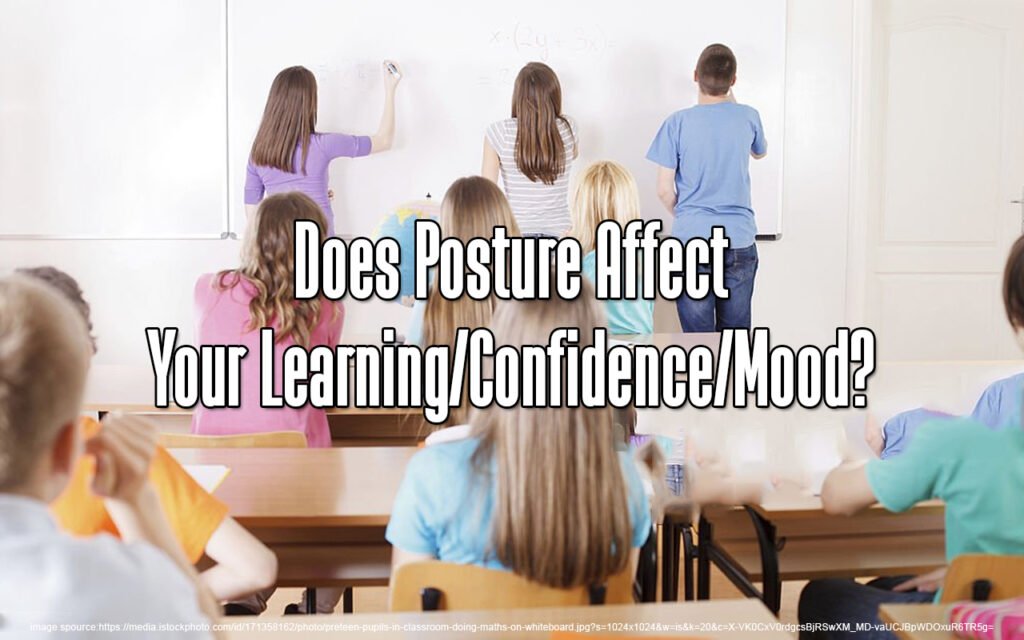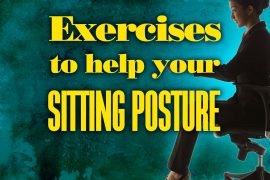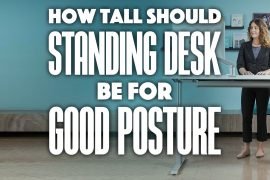[Updated on 1 August 2024] Are you slouching towards the floor or hunched over your screen like a rough being? You’ve heard that sitting too much can kill you right? Well, great posture can have a profound effect on who you are. Lack of movement has the capability of translating into a host of health complications including diabetes, cardiovascular diseases, and even cancer. What’s worse, spending too much time hunched over your computer has significant consequences on your mental well-being. Does posture affect your learning, confidence and mood. Next time you feel unfocused, depressed, or sad, pay close attention to your posture.
Scientists at top level institutions like Columbia and Harvard universities have been studying the link between the brain a bad posture for years. And according to recent studies, an improvement in posture can greatly improve an individual’s mood.
A research study carried out on students at Columbia State University discovered that students who were told to sit up straight are more likely to believe the thoughts they wrote down while in that posture in regards to whether they believed in themselves. Those who slumped over their desk were less likely to believe in writing down feeling about their achievements.
According to Richard Petty, Professor of Psychology at the university, results have shown that our body posture affects what others think of us and what we think of ourselves. While we have learned that sitting up straight gives a good impression to others, sitting up straight convinces you through your current posture.
How does Bad posture make you afraid or sad?
Table of Contents
Science has over the years proven how arranging our muscles impacts on how we feel about ourselves. Even Botox treatments come with a bonus side effect of less depression. According to a New Zealand study published on Health Psychology, a less invasive path to an instant positive mood shift is to sit up straight simply.
 In this study, researchers monitored the effects of straightened or slumped posture on the minds of more than 70 individuals strapped to their assigned postures. Both their heart rates and blood pressures were measured. They went through a series of assigned tasked designed to monitor their self-esteem, mood and stress levels.
In this study, researchers monitored the effects of straightened or slumped posture on the minds of more than 70 individuals strapped to their assigned postures. Both their heart rates and blood pressures were measured. They went through a series of assigned tasked designed to monitor their self-esteem, mood and stress levels.
If this is starting to sound like a quantum physics class, well, your tutor must have been onto something. The study revealed that the upright participants recorded feeling more excited, strong and enthusiastic. The slumped individuals, on the other hand, reported feeling sleepy, sluggish, hostile, fearful, nervous, quiet, still, dull, and passive. Additionally, they also had stronger pulse responses to their slouched counterparts.
Having an upright posture has all the benefits. The study concluded that posture has a direct link with high self-esteem, fewer negative emotions, and less social fear.
In another study published in 2009 in the European Journal of Social Psychology, 71 students were instructed to either sit slouched forward with their faces looking at their feet or to sit upright push out and push out their chests.
The students listed down three negative or positive personal traits that contributed to their future professional performance and job satisfaction in these positions. The results of the survey revealed that the students rated themselves based on their posture as they answered. Students who sat upright believed in the negative and positive traits they wrote down while their slouched counterparts didn’t believe in their sentiments.
While the students in an upright position had an easier time thinking of positive or empowering traits about themselves, those in a slouched position probably had a less difficult time writing down their hopeless, powerless negative traits.
Sitting in slouched positions linked to depression
 According to Professor Erik Peper, a Psychology professor at San Fransisco State University, sitting down in a helpless, collapsed position makes it easier to evoke negative memories and thoughts while sitting down in an upright position makes it easier to have positive memories and thoughts.
According to Professor Erik Peper, a Psychology professor at San Fransisco State University, sitting down in a helpless, collapsed position makes it easier to evoke negative memories and thoughts while sitting down in an upright position makes it easier to have positive memories and thoughts.
One of Peper’s studies reveals that emotions and thoughts affect our posture and energy levels and in retrospect, energy levels and posture affect our emotions and energy levels. His research discovered that it only takes two minutes to change your hormones. Meaning you could change your mood as you wait for your coffee to brew.
Since posture has the capability of affecting our moods and thoughts. he increase in slouched sitting and working from long hours on the computer, to looking down at your smartphones has a direct effect on the rise of depression in young adults over the last few decades.
According to Peper’s research posture is a significant contributor to depression and low energy levels. Slouching also results in frequent headaches, shoulder and neck pains. Therefore, if you are constantly trying to remember not to slouch at work. You might get some motivation thinking about how having an upright posture can help or hurt your mood. Remember, your body language isn’t just for yourself. It’s for other people too.
Can body language define who you are?
 According to a psychologist, Amy Cuddy, in a TED talk. Our non-verbals affect us. The more confident and powerful an individual feel, the more they tend to open up. If your chin is up, your shoulders are back; then you are actively taking up more space wherever you go. But, if you feel small, unhappy or insecure, you always want to become small, taking up as little space as possible looking down and hunching your shoulders.
According to a psychologist, Amy Cuddy, in a TED talk. Our non-verbals affect us. The more confident and powerful an individual feel, the more they tend to open up. If your chin is up, your shoulders are back; then you are actively taking up more space wherever you go. But, if you feel small, unhappy or insecure, you always want to become small, taking up as little space as possible looking down and hunching your shoulders.
An Ohio State University study had an even freakier mind and body connection. According to the study, when you nod your head to affirm approval or shake your head in disapproval. You are not just sending a message to other people, you are directly influencing yourself.
The study revealed that these simple gestures influenced people’s agreement with an editorial they followed while shaking or nodding their heads. It revealed that the other body movements like writing or non-dominant hand could also influence individuals’ attitudes even on personal issues such as self-esteem.
These body movements exert their influence on us subconsciously without us being aware of what is taking place. Richard Petty, Co-author, and professor of Psychology at Ohio State University, explains, we often think that shaking our heads or nodding is an action that communicates to other people, but as it turns out, we are also communicating to ourselves. In essence, shaking or nodding our heads as well as our body movements are a sort of self-validation that conforms to us how we think about ourselves.
In another study, researchers told 82 university students they were researching the quality of stereo headphones during jogging or dancing. Half of the students were instructed to move their heads up and down nodding once per second with the headphones on. The people wearing headphones were told to shake their heads, side to side.
After listening to a recorded editorial, the study found out that the student’s movements did affect whether or not they agreed with the recorded editorial. The effects have more complicated results than might be assumed.
According to the study, nodding your head up and down is, in effect, telling yourself that you have confidence in your thoughts whether positive or negative. Shaking your head in disapproval does the opposite giving individuals less confidence in their thoughts.
Therefore, the participants in this study who heard the editorial that made good arguments agreed more with the messages when they nodded yes than when shaking their heads side to side in disapproval. The nodding increased the student’s confidence in their negative thoughts to poor arguments they heard over the headphones in contrast to shaking their heads sideways.
Why is good posture important?
Great posture can turn your life around. Good posture will not only stop you from getting neck and back pains; it will also help you improve your stress levels, mood, digestion, confidence, breathing, appearance, and productivity. So, what effect does posture have on our daily lives?
Posture, learning, and memory
Several studies have tied the human ability to remember things such as depressive thoughts, gender, and even marijuana use. However, according to new research from Indiana University, your posture is critical in the early stages of acquiring knowledge. Several studies have revealed that human memory has ties to locations of objects, but according to Linda Smith, lead researcher, there are no studies that have shown how your body position plays a role in human memory.
In their study, Linda and her team used infants as well as robots to study how objects of cognition such as the memory of objects or words have ties body positions. In this study, robots mapped an object’s name by sharing associations of posture in their programming.
The results of the study indicated that the human body plays a role in early object name learning and how infants use their body position in space to connect ideas. Using a robot model to understand toddler learning had extensive implications in understanding how young people’s brains work.
Both the infants and robots aged between 12 and 18 underwent a series of experiments. The first experiment involved showing an object to their left side, and a different object on the right. Severally, this process was repeated to create an association between the two body postures and objects. The two body postures and objects were associated through the repetition of this process. The second experiment was without the use of objects. The infants and the robots perform actions eliciting the same postures from the initial experiment, instead of being given commands to have those actions performed on them.
Before repeating the objects’ names and placing them in different locations, they were set in the same locations without labels first. The researchers discovered the robot made a consistent connection between the object and its name in 20 repeats if the experiment. In subsequent tests, we placed the target and another object in both locations. It prevents association with a specific posture; the robot cannot remember the target object.
For infants, the result slightly differed. However, their understanding remained the same. Meaning, posture plays an important part when it comes to remembering the names of objects. The researchers still indicated that the study needed further scrutiny to see if the association only applies to infants.
The lead researcher has discovered new ways for scientists to investigate the connection between cognition and the body as well as the body and its surroundings give shape to mental entities, such as words, thoughts, and representations of objects, which seem to have no bodily or spatial components.
Your muscles are not straining to keep your body upright, allowing for good posture. When an individual adopts a good posture, the vertebrae are normally stacked neatly on top of another. The spine is not straining to stay aligned.
If an individual adopts an incorrect sitting posture, it could quickly lead to fatigue, back strains, shoulder and neck pains. This impact consequently leads to a decline in comfort and focus.
How can you solve bad student posture for better learning?
 Individuals everywhere need to pay attention to posture. Students and workers all over the world spend many hours on their phones and computers. It’s important to note these devices did not have posture in mind during their design phase.
Individuals everywhere need to pay attention to posture. Students and workers all over the world spend many hours on their phones and computers. It’s important to note these devices did not have posture in mind during their design phase.
The following are simple solutions for tutors and employers who want to ensure their students or workers don’t adopt a poor posture during learning.
- When seated, it’s important to have your feet flat on the ground. Dangling feet will result in a curved spine. Additionally, you need to ensure that your arms are resting on your tabletop with your elbows well below your shoulders. Keep your elbows from resting too high on the desk. It’s also important that you do not lean up to get to the table surface.
- When working for long hours on your desk or computer, take a movement break from time to time. Fidgeting is often a sign of discomfort, the moment you feel the need to fidget, take a movement break. A short dance to your latest jam could help get your blood flowing right again welcoming muscle release.
- Check your posture position regularly throughout the year. Adopting a bad posture while seated during physical development especially for children will have negative effects on the body.
Advanced solutions to improve posture for better learning?
Invest in standing desks
 These kinds of desks have become more and more popular for knowledge workers. A sedentary lifestyle has a dire effect on human health. More and more working and learning institutions are embracing sit-stand desks. This type of desk works standing or sitting. In a learning situation, you could easily stretch out without losing focus on a lecture. Replacing office tables or institutional learning desks isn’t a cheap affair, and often comes at a high cost. However, if you feel the need to improve your posture and better your posture, it’s a worthy expense.
These kinds of desks have become more and more popular for knowledge workers. A sedentary lifestyle has a dire effect on human health. More and more working and learning institutions are embracing sit-stand desks. This type of desk works standing or sitting. In a learning situation, you could easily stretch out without losing focus on a lecture. Replacing office tables or institutional learning desks isn’t a cheap affair, and often comes at a high cost. However, if you feel the need to improve your posture and better your posture, it’s a worthy expense.
Stability balls
They are the same as the bouncy balls you would find in a gym. However, a stability ball has rubber stands at the bottom to prevent it from rolling around. According to a research study carried out in seven us schools, students, improved or retained their academic results over the period and evidence from their tutors indicated students who used these balls were attentive and quieter during learning sessions.
Disco cushions
Mildly inflated rubber cushions with a bumpy-side on one flat side are patented as cushions with a unique design. The manufacturers design them to promote active sitting and function by gently encouraging sensory input and engaging the spinal muscles. They are usable both on the floor or on a chair. A study conducted on 32-second grade learners found that the use of these cushions a significant difference in their attention during class sessions.
How can posture affect confidence and self-esteem?
Good posture is directly related to confidence and an uplifted mood. One measures one’s self-esteem as the overall attitude, both positive and negative, towards oneself. Global self-esteem has two aspects; the first one is self-liking or self-worth and the second one us self-competence or self-efficacy. An individual’s posture has an impact on how they view themselves.
The Stress Effect
According to psychology, your stress levels affect your posture and vice versa. Researchers conducted a study to investigate upright seated posture’s effect on cardiovascular and affective responses to psychological stress task, compared to a slumped seated posture.
The study revealed that adopting an upright seated posture helps maintain better self-esteem during stress, reducing individuals’ negative moods and increasing positive mood in comparison to a slumped posture. Therefore, sitting upright works as a behavioral strategy that helps build resistance to stress.
Upright posture for uplifting mood
Depression is often diagnosed by the presence of a slumped posture. Patients who have closed, slouched postures are prone to suffer from clinical depression compared to those with upright postures.
According to a new study, sitting upright with proper posture reduces fatigue boosting your mood especially in depressed patients. Scientists have also discovered that students who suffer from exclusion from social groups have a submissive slouched posture. Some of the students evaluated tended to play video games in a slouched position. Non-excluded students, on the other hand, did not.
 Children included in social circles demonstrated an upright posture, self-confidence, and a more positive mood. The structural framework of an individual’s body is directly related to their level of self-esteem and mood. Having a slouched posture is not only dangerous to your physical wellbeing, but also for your mental health.
Children included in social circles demonstrated an upright posture, self-confidence, and a more positive mood. The structural framework of an individual’s body is directly related to their level of self-esteem and mood. Having a slouched posture is not only dangerous to your physical wellbeing, but also for your mental health.
According to researchers, slumping is a defensive posture that can trigger negative memories. Something people with anxiety issues are sensitive over. To get rid of negativity and promote higher levels of positivity, you might need to change your physiology to have a change of mind.
If you have a terrible posture, like most people, and you are not aware of it, do not panic. Changing posture sounds impossible and overwhelming, but it doesn’t have to be. You can start easily by doing small everyday things like power poses (Superhero standing). Have your feet spread wide with your hands placed on your hips before getting into a big or important meeting. You may also make a point of stretching out throughout your day. Both of these practices can significantly help you reassess your posture.
If you constantly slouch back in your chair and face downward, try sitting up straight by arching your back and engaging your core. Take time to check your reflection in the mirror and ensure that your spine is elongated and your shoulders are relaxed. Through effort and time, you can achieve better posture, which will be beneficial for your mind in the long run.
Regularly sitting up straight and standing up tall with a resilient posture will help you achieve the mental shift that adds quality to life experiences. You posture matters a great deal, and will not be out of fashion anytime soon. Take good care of your posture to take care of your mind.
It’s now clear that our posture has more to do with our minds that we might have thought before. What’s more perplexing is it seems our bodies come first. When we alter our body language and posture, it subconsciously affects our thinking and decision making. Therefore, Next time you are feeling insecure or anxious, sit upright and hold your head up. There might be something to the “fake it till you make it” slogan after all.
FAQ’s
Q1. Is there scientific evidence supporting the link between posture and learning?
According to multiple studies, good posture can boost cognitive function, information processing, and academic performance.
Q2. Can posture affect how others perceive our confidence levels?
Absolutely, body language is key in shaping others’ perceptions of us. Having good posture shows confidence and competence, while slouching can make you seem less sure of yourself.
Q3. How quickly can one notice a change in mood by improving posture?
The impact of better posture on mood may differ from person to person. Some individuals might feel an instant mood boost, while others could see gradual improvements with consistent posture habits.
Q4. Can posture-related discomfort impact learning and mood?
Absolutely, dealing with discomfort from bad posture can really throw you off, making it hard to focus and putting you in a bad mood, which can affect how well you learn.
Q5. Are there specific exercises or stretches to improve posture for better learning and mood?
Yes, focusing on core muscles, back muscles, and flexibility exercises can improve posture. Adding some stretches and strength exercises to your routine can really help improve your posture and overall well-being.
Q6. How can parents help their children maintain good posture for optimal learning and mood?
Parents can help their kids by reminding them to sit and stand up straight, setting up comfy furniture, cutting down on screen time, and getting them moving to build healthy posture habits.
Conclusion
In conclusion, it’s clear that posture plays a big role in our daily lives, affecting how we learn, our confidence, and even our mood. Keeping a good posture isn’t just about focusing better and remembering stuff when you’re learning. It also helps you feel more confident by showing you’re sure of yourself. By the way, did you know that posture can really affect your mood? Standing tall with open body language is connected to positive vibes, while slouching tends to bring on feelings of stress and negativity.
When we realize how posture affects our mental and emotional well-being, we can start making small changes to improve our posture habits and ultimately boost our quality of life. Remember to sit up straight, stand taller, and own that good posture for a happier, more confident, and successful version of yourself!









1 Comment
I slouch all of the time because I am too fat to have good posture. Good posture makes my back hurt and slouching is comfortable.